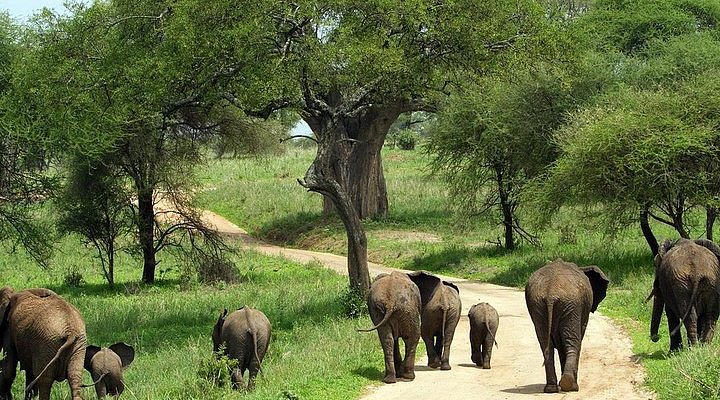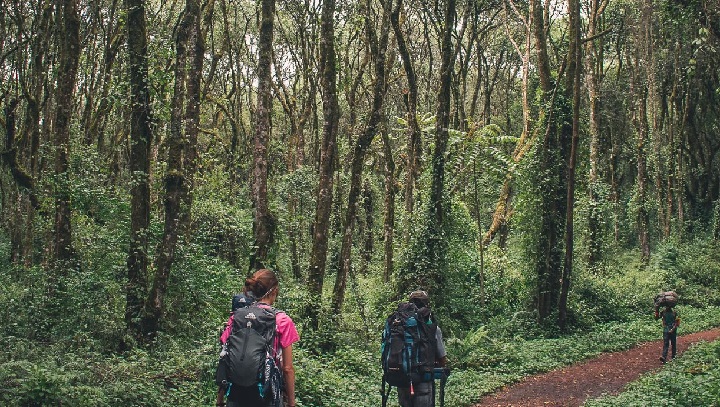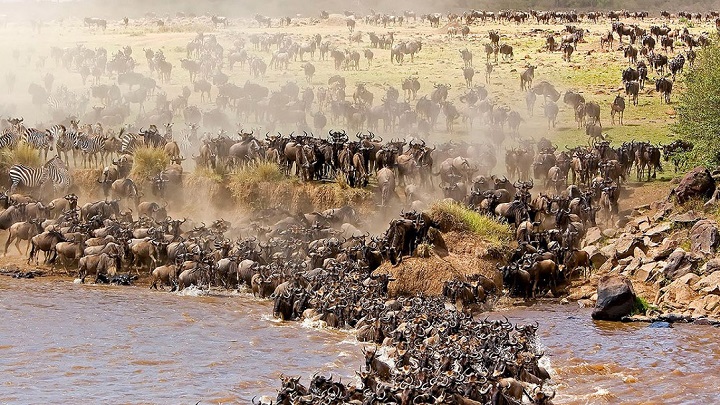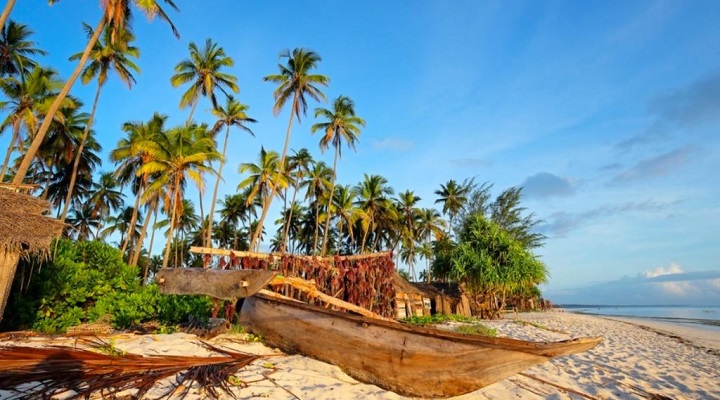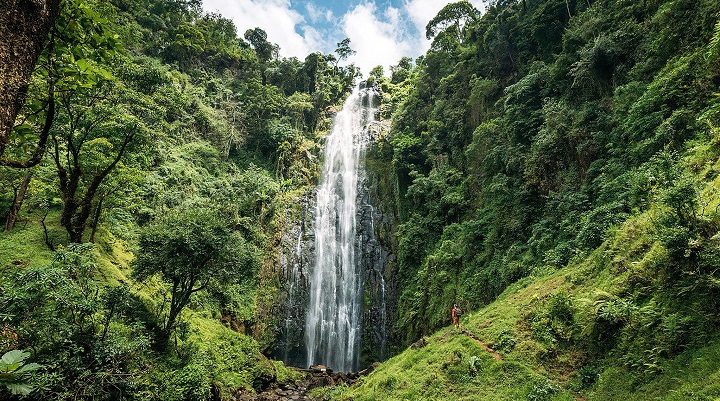
14 DAYS: (Materuni waterfalls,7-Day Kilimanjaro climb Machame & 3-Day Safari ).
Embark on a 14-day adventure that blends Tanzania’s natural beauty, thrilling challenges, and unforgettable wildlife encounters.
Your journey begins with a visit to the Materuni Waterfalls, where you’ll enjoy stunning scenery and learn about local coffee culture. Next, take on the challenge of a 7-day Kilimanjaro climb via the Machame Route, one of the most popular and scenic trails to Africa’s highest peak—offering breathtaking views and rewarding moments all the way to the summit.
After the mountain, unwind and discover the wild side of Tanzania on a 3-day safari through iconic national parks such as Serengeti and Ngorongoro Crater. Witness the Big Five, dramatic landscapes, and the wonder of Africa’s wildlife in its natural habitat.
This tour is a perfect combination of adventure, culture, and safari—designed for travelers seeking the full Tanzanian experience in one unforgettable journey.
Day 0 : Pickup to Airport
DAY 1: Materuni Waterfall & Coffee Tour
• Waterfall Hike (~40 min): Begin a guided walk through lush terrain, learning about Chagga culture, local agriculture, and plant life. On a clear day, catch glimpses of Kilimanjaro summit
• Materuni Waterfall: Reach the base of this majestic 70–90 m waterfall and enjoy a refreshing swim in its cool, clear pool—don’t forget your swimwear.
• Coffee Plantation Experience: Return to Materuni village for a traditional Chagga coffee-making demonstration. Learn each step—from picking beans to roasting, grinding, and brewing—while joining in singing and dancing. Sample the coffee you helped make.
• Lunch: Enjoy a traditional Chagga lunch, often including local dishes and optional banana beer, served at a family home or farm setting.
• Afternoon Return: Depart Materuni by late afternoon, heading back to Moshi with a memorable blend of nature, culture, and coffee aromas.
Approximate Schedule:
Pickup: ~9:00 AM → Hike: ~40 min each way → Swimming/Lunch → Coffee demo → Return by 4:00–5:00 PM
Distance: ~15 km from Moshi,
DAY 2: Machame Gate (1,800m/5,905ft) to Machame Camp (3,000m/9,840ft)
DAY 3: Machame Camp (3,000m/9,840ft) to Shira 2 Camp (3,840m/12,600ft)
DAY 4: Shira 2 Camp (3,840m/12,600ft) to Barranco Camp (3,950m/12,960ft)
DAY 5: Barranco Camp to Karanga Camp
Distance: 5 km/3 miles
Hiking time: 4-5 hrs
Habitat: Alpine desert
We begin the day by descending into a ravine to the base of the Great Barranco Wall. We will then climb the non-technical but steep, nearly 900ft, cliff. The Barranco Wall, also known as the Kissing Wall, is approximately 3 ft. wide. This narrow section is famous because climbers often place a kiss on the rock as they pass by. Climbers also “hug” the outcrop and breathe a sigh of relief on the other side as they realize it wasn’t nearly as intimidating as it looked.
From the top of the Barranco Wall, we cross a series of hills and valleys until we descend sharply into Karanga Valley. One more steep climb up leads us to Karanga Camp. This shorter day will prepare us for higher elevation at the summit.
DAY6: Karanga Camp to Barafu Camp
Distance: 4 km/2 miles
Hiking time: 4-5 hrs
Habitat: Alpine desert
We leave Karanga and hit the junction which connects with the Mweka Trail. We continue up the rocky section to Barafu Hut. At this point, you have completed the Southern Circuit, which offers views of the summit from many different angles. Here we make camp, rest, and enjoy an early dinner to prepare for the summit day. The two peaks of Mawenzi and Kibo are visible from this position.
DAY 7: Barafu Camp to Uhuru Peak - Mweka Camp
Distance: 5 km/3 miles
Hiking time: 7-8 hrs
Habitat: Arctic
Uhuru Peak to Mweka Camp
Elevation: 5,895m/19,341ft to 3,067m/10,065ft
Distance: 12 km/7 miles
Hiking time: 4-6 hrs
Habitat: Rain forest
Very early in the morning (around midnight), we begin our push to the summit. This is the most mentally and physically challenging part of the trek. At this elevation and time of day, the wind and cold can be extreme. We ascend in the darkness for several hours while taking frequent but short breaks. Near Stella Point (18,900ft), you will be rewarded with the most magnificent sunrise you are ever likely to see coming over Mawenzi Peak.
Finally, we arrive at Uhuru Peak— the highest point on Mount Kilimanjaro and the continent of Africa. Here, you can take a moment to reflect on your tremendous accomplishment. You’ll obviously have the opportunity to take a few pictures from the ‘Rooftop of Africa’ to memorialize this special moment. From the summit, we now make our descent continuing straight down to the Mweka Hut campsite, stopping at Barafu for lunch. The trail is very rocky and can be quite hard on the knees; trekking poles are helpful. Mweka Camp is situated in the upper forest and mist or rain can be expected in the late afternoon. Later in the evening, we will enjoy our last dinner on the mountain and a well-earned sleep.
DAY 8: Mweka Camp to Mweka Gate
Distance: 10 km/6 miles
Hiking time: 3-4 hrs
Habitat: Rain forest
On our last day, we continue the descent to Mweka Gate where we will be met by our driver who will transport us back to the hotel in Moshi. Here, we can relax with some refreshments, perhaps a local Kilimanjaro beer, while we wait to receive our summit certificates. At lower elevations, it can be wet and muddy. From the gate, we continue another hour to Mweka Village. A vehicle will meet us at Mweka Village to drive us back to the hotel in Moshi.
DAY 9 : Tarangire National Park
Day 10: Lake Manyara National Park.
Day 11: Ngorongoro Crater – Arusha – Airport
Inclusions
Accommodation
• Nights hotel accommodation:
1. Night prior to the climb2. Night after the climb
3. Night Acommodations in Zanzibar
• Shared tent during the trek (2 climbers per tent; individual tents available on request)
• 2-inch sleeping mat for comfort during the trek
• Nights of accommodation in camping safari settings
Camping Gear
• High-quality 2-person tents• Mattress, table, chair, and pillow
Kilimanjaro Climb
• Friendly, professional mountain guides with wilderness first aid certification and extensive experience• 3 porters per climber, each carrying up to 15 kg of personal luggage
• 3 hot meals daily while on the mountain, with treated and filtered drinking water provided throughout
• Daily hot water for washing
• Cook trained to prepare various dietary options (including vegan, vegetarian, and gluten-free); advance notice required
• Portable oxygen tanks and oximeter
• Emergency first-aid kit
• Park entry fees, camping fees, and Team Kilimanjaro Rescue fees
• Transportation to and from the Kilimanjaro gate
Safari
• Professional driver/guide during the safari• 4×4 Land Cruiser with pop-up roof, fridge, and inverter for mobile charging
• Daily game drives during the safari
• Breakfast, lunch, and dinner provided daily during safari days
• Mineral water (3 liters per person per day)
• Park entry and conservation fees (Tarangire, Serengeti, Ngorongoro)
• Domestic flight: Arusha → Zanzibar
Zanzibar
• Guided Stone Town walking tour• Spice Tour with Swahili lunch
Transfers & Transport
• Meet & greet at airports (JRO & ZNZ)• Private airport pickup and drop-off
• All transfers within Tanzania and Zanzibar as per itinerary
Taxes & Charges
• 18% VAT on tour fees and services• All applicable government taxes
________________________________________
Exclusions
• International flights to/from Tanzania• Travel and medical insurance
• Visa fees
• Optional activities (e.g., hot-air balloon safari, scuba diving, dhow sailing, Jozani Forest visit)
• Personal expenses (e.g., laundry, telephone, beverages)
• Sleeping bag rental for camping safari (USD 30)
• Lunches, dinners, and drinks at hotels before and after the climb
• Portable flush toilet with toilet tent (USD 100 for the entire trek)
• Meals not specified in the itinerary
• Alcoholic and soft drinks unless otherwise stated
• Additional nights before or after the tour
________________________________________
Tipping Guidelines
Kilimanjaro
• Guide: USD 20 per day• Cook: USD 15 per day
• Porter: USD 10 per day
Safari
• Guide/Driver: USD 20 per day• Cook (if applicable): USD 15 per day
________________________________________
